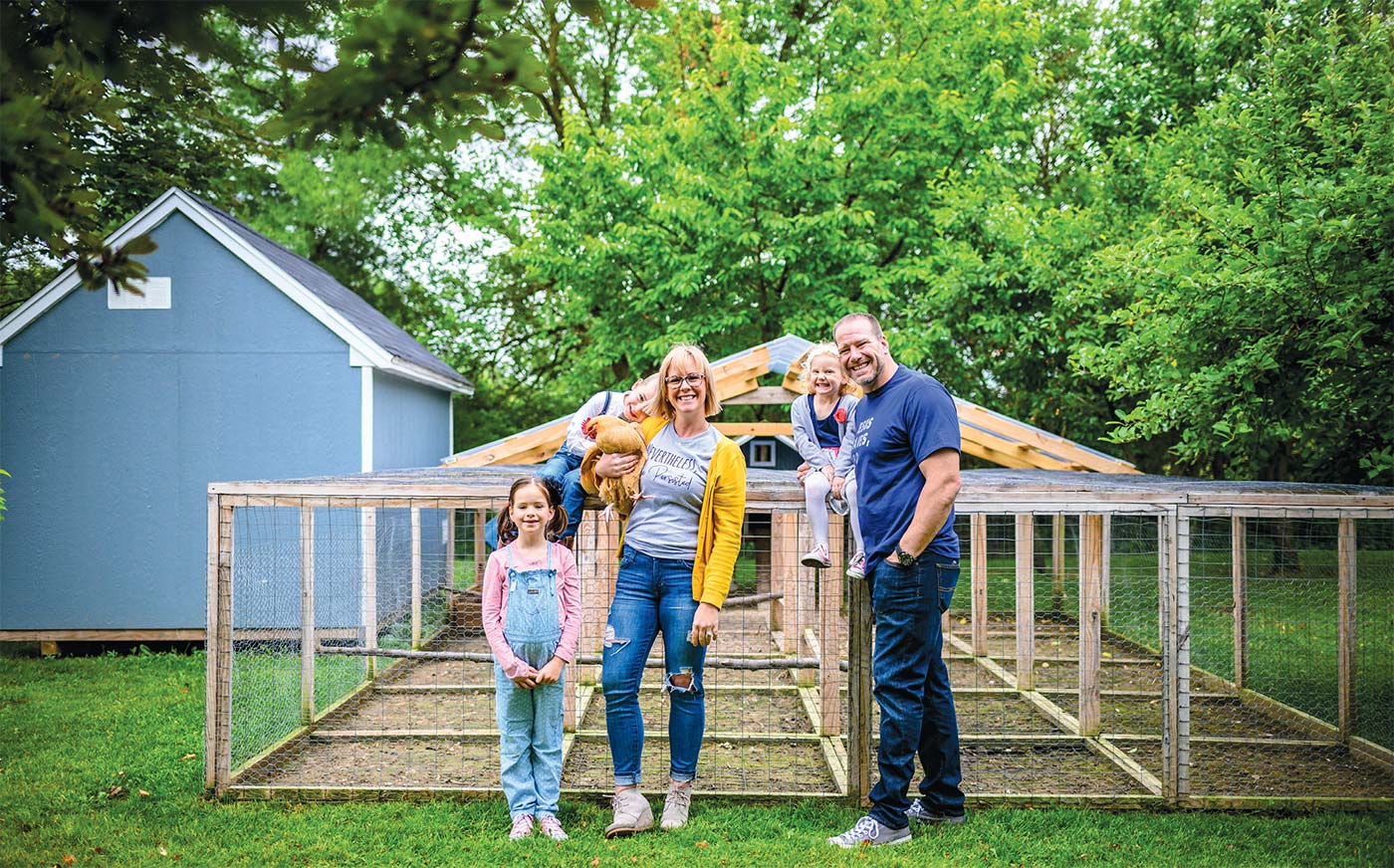CAMP DEMULLING
For former NFL player Rick DeMulling, playing the role of protector feels like a natural fit. For years, the six-foot-four offensive lineman shielded quarterbacks from sacks and tackles as a member of the Indianapolis Colts, the Detroit Lions and the Washington Redskins.
Now, Rick and his wife, Danielle, spend their days on a different kind of field, protecting the bees and chickens and building a healthy way of life for their three children—Corinth, 7, Jeremiah, 5, and Grace, 3—on their family’s seven-and-a-half-acre homestead.
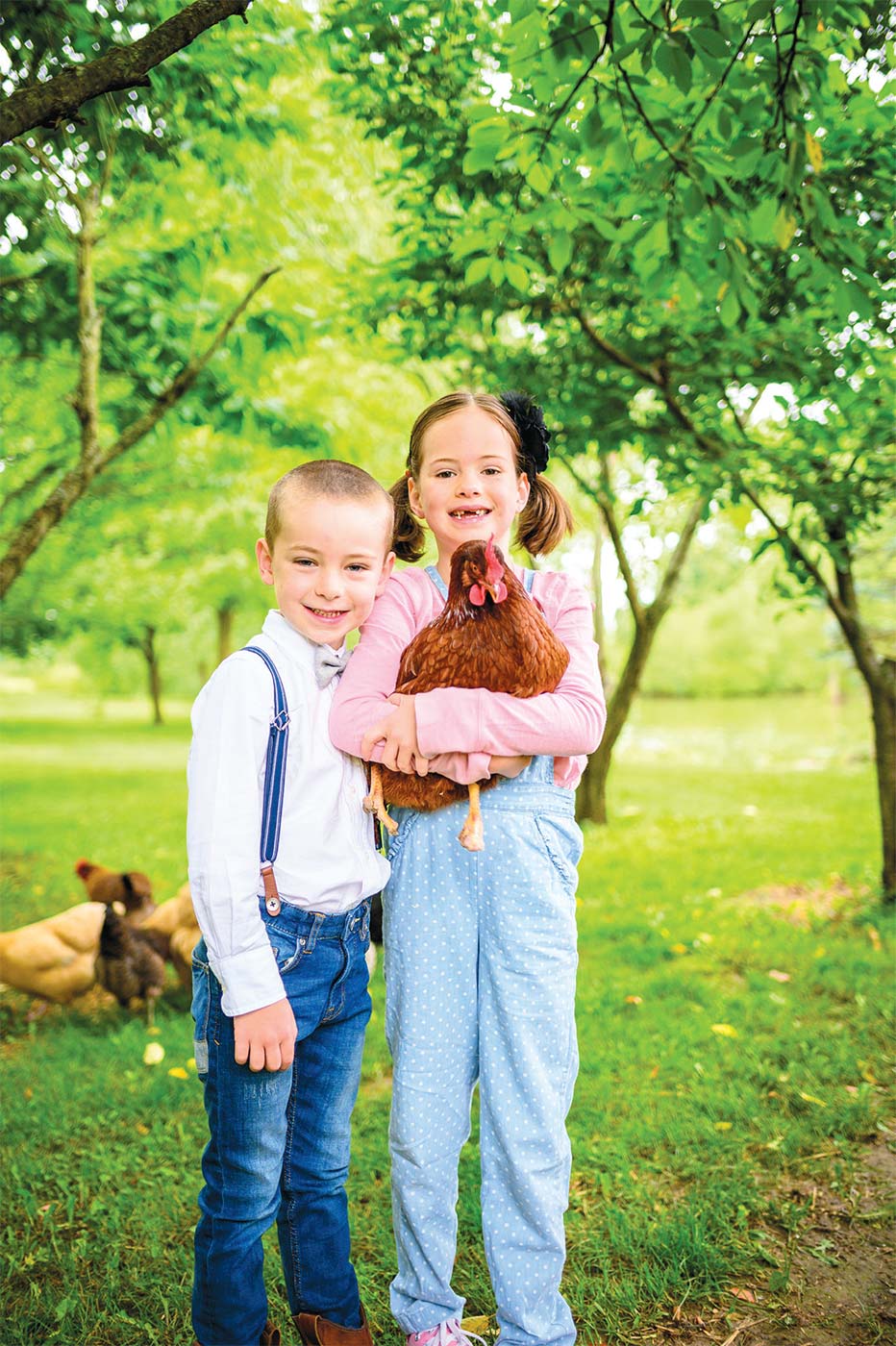
ROOTED IN PLACE
The DeMullings didn’t always see themselves living the rural life. In fact, the couple spent their first year and a half of marriage in an RV, moving to new cities every three months while Danielle worked as a traveling nurse. Rick had recently retired from the NFL at the time.
When the couple decided to settle down, the Indianapolis area was an easy choice: Rick had spent the majority of his NFL career here, Danielle had moved to Indianapolis after college and they both remained connected to the community even during their years away. But deciding exactly where to move took some compromise.
“We had a challenging time trying to decide where to settle down because our hearts were pulled in different directions,” Danielle explains. “I’m a city girl through and through. I love accessibility. I like exploring and being busy. And he was, like, ‘I want land. I want someplace where we can just kind of be and be peaceful and check out.’”
When the DeMullings first saw their four-bedroom house near Brownsburg, sitting on seven and a half acres with a garden, fruit trees and fishing pond but close enough to Indianapolis to take advantage of restaurants, shopping and other cultural amenities, they knew they’d found their place. They moved in the summer of 2010.
TAMING THE HOMESTEAD
The first thing the DeMullings cultivated on their new homestead was the overgrown garden. After taming the weeds and turning the soil in their picket-fence-encircled beds, the couple began experimenting with growing different varieties of vegetables and herbs.
“We didn’t know a lick about anything, so we just kind of came to the agreement that we’re just going to give it a try with no expectation,” Danielle remembers, noting that many of their early efforts were successful despite having “no idea what we were doing.”
“We had a lot of zucchini,” adds Rick, who also works as an insurance agent, a real estate investor and a varsity football coach for Traders Point Christian Academy.
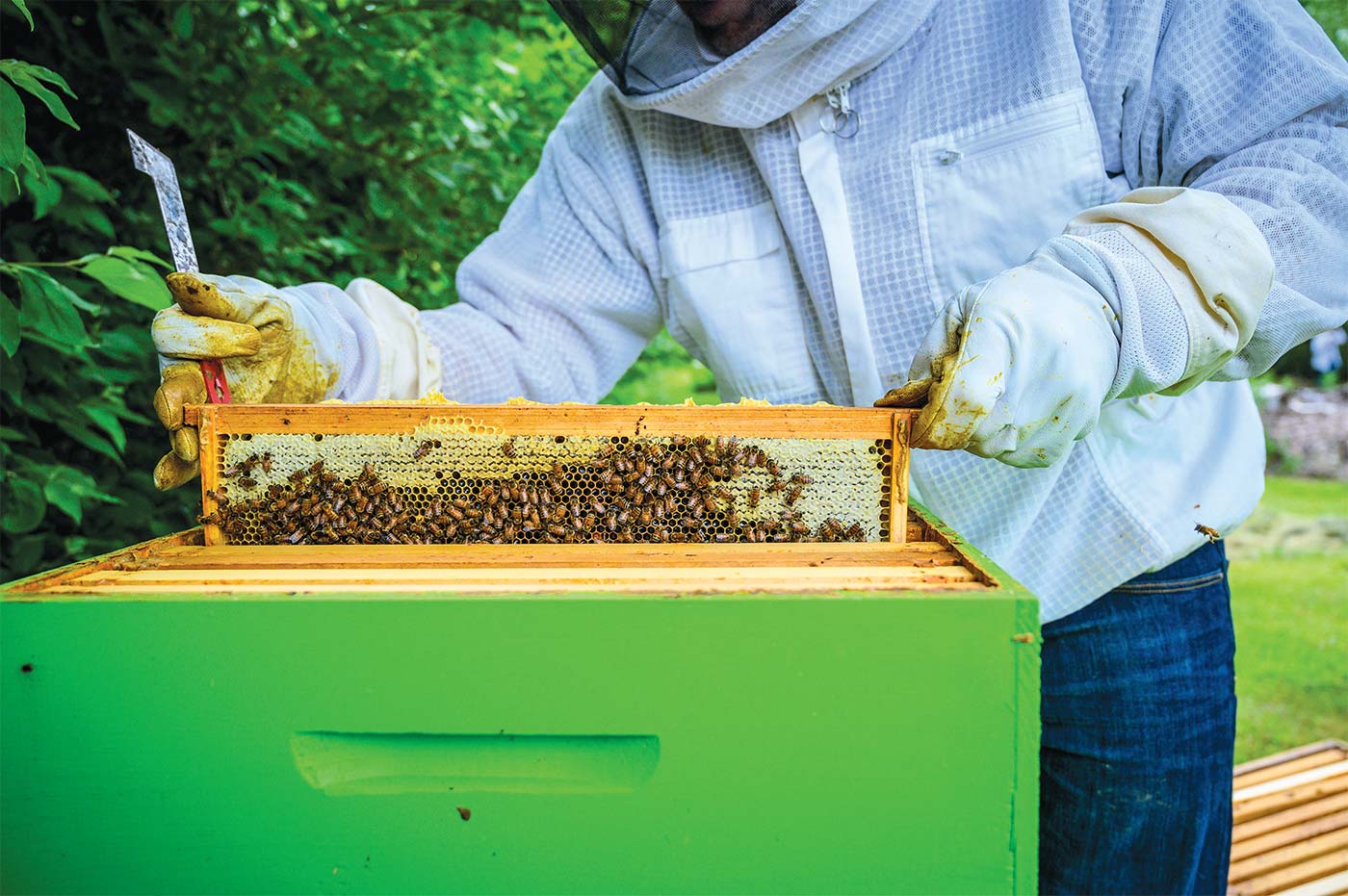
INVESTING IN BEES
After a few years of gardening, the DeMullings added bees to their burgeoning homestead. For the first two years, they paid a local beekeeper to care for the bees. By year three, however, the couple decided to take on beekeeping themselves. In February 2017, they signed up for The Beekeepers of Indiana’s Indiana Bee School, attending all the beginner sessions. They left with a renewed passion to make beekeeping work on their own land.
That spring, they ordered their first nucleus colony (a “nuc” to bee buffs; see sidebar) from R.J. Honey in Lebanon. They set up their hive in the northwest corner of their lot, far enough away from the children’s tree house to keep the kids and bees out of each other’s way while also protecting the hive from extreme weather with an overgrown fence row.
Since bees routinely travel as much as a mile or two away from their hive to collect pollen and nectar, the corner location still allows the bees to spend lots of time around the cherry, peach, apple and pear trees, garden and flowers throughout the property. And the DeMullings love having the bees around.
“We love teaching our children the necessity of bees, and obviously the ulterior motive here is honey,” Danielle says. “But we want to support the bee community, too, if we’re able, and we’re just fascinated by the process.”
“It’s pretty cool when you open up the hive and you have one of the frames in your hand and they’re just going to town or you see the queen going in and out,” Rick says. “It’s pretty cool watching the whole thing.”
LIQUID GOLD
But beekeeping hasn’t been easy for the DeMullings, who’ve had to start over with a new hive each year.
“It’s been a lot of trial and error, and we’ve lost a lot of hives,” Danielle explains.
“And it’s on us,” Rick admits. “We either weren’t feeding them enough or we didn’t take care of the mites. This last year we lost a hive because there was a mouse in the hive.”
But they also successfully overwintered their first hive last year, too, the bright green one that survived the polar vortex of 2019 and now sits just past the tree house. This fall, the DeMullings will harvest their first honey.
“I think we could have harvested last year, but we decided to keep the honey in the hive so it could be stronger this year,” Rick says. That decision paid off.
“This successful hive will finally yield some liquid gold,” Danielle says.
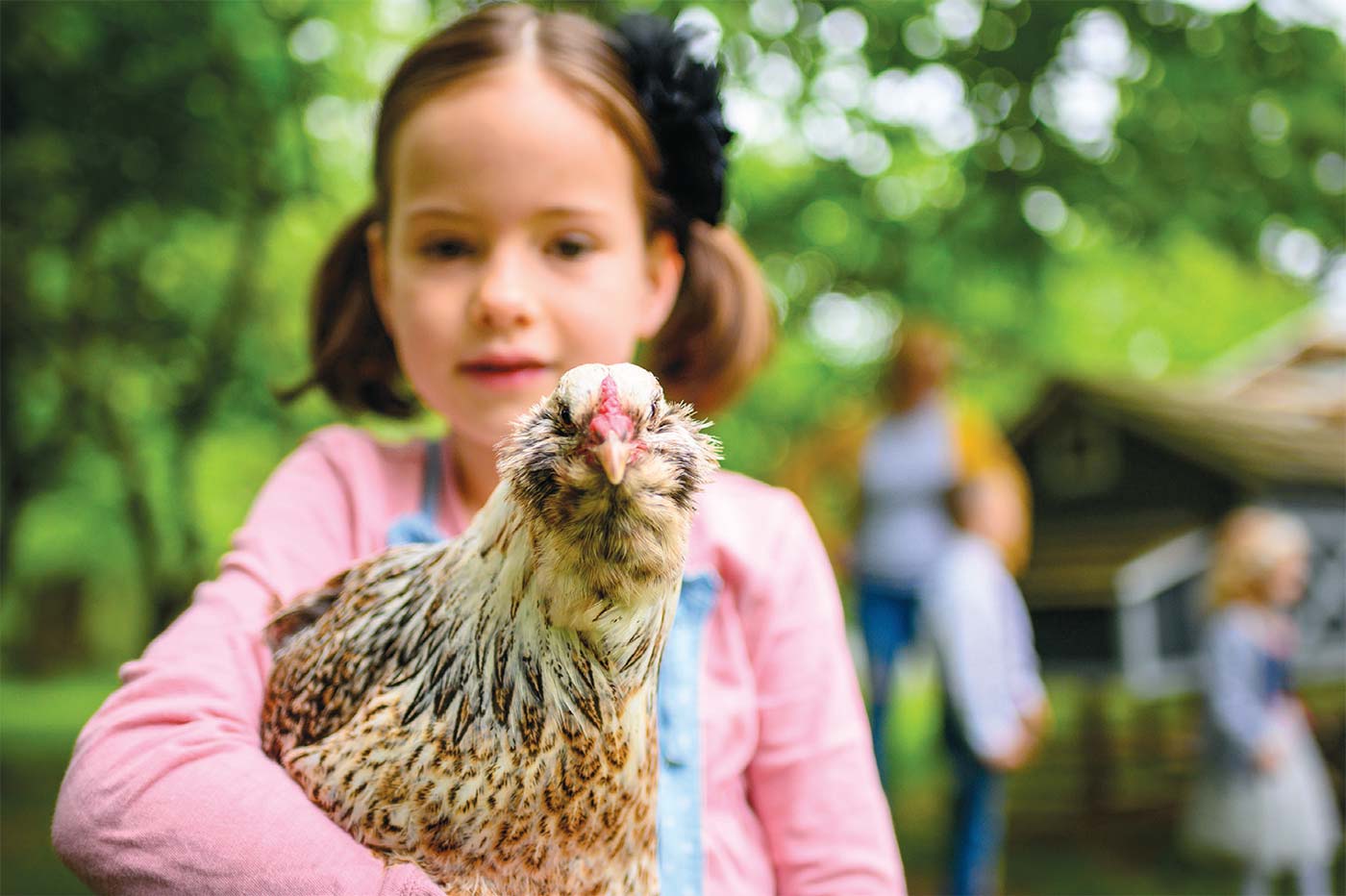
FLYING THE COOP
About the same time the DeMullings began beekeeping, they also starting raising chickens.
“When we decided to go to bee school, we were either going to do chickens or to do bees. Because at that point our youngest was 1 and we were in the thick of chaos,” Danielle recounts.
But after attending a chicken class at Agrarian, a local homestead supply store in Broad Ripple, they realized they didn’t want to choose.
Initially the DeMullings purchased 6 chicks and a bright blue chicken coop, built by Agrarian co-owner Andrew Brake, that now sits between the garden and the fruit trees. After a few ups and downs with their flock, including at least two “death-by-hawk” incidents, the DeMullings currently have 13 hens and gather almost as many eggs each day, especially during the summer months.
“Overall, the experience has been fantastic,” Danielle says. “Our kids love our chickens.”
PROTECTING A WAY OF LIFE
Whether it’s an overabundance of zucchini, successfully overwintering a hive or even explaining death to their children following a chicken fatality, ultimately what’s at stake here is the way of life the DeMullings have chosen for their family. Spending time outdoors, understanding the role bees play in food production, learning about permaculture and sustainable farming—these are the things Rick and Danielle both want to protect.
“Where our food comes from is a big, big deal, understanding that buying your food at a grocery store doesn’t mean it’s good food,” Rick says. “And look at our health as a society. Our age is going up or even stabilizing, but our quality of life is going down. Think about how unhealthy people are.”
“I think that’s where the drive comes. We know why this is important. We worked really hard to have a better and healthier lifestyle,” Danielle says. “We are just starting to learn, and sometimes that gets overwhelming to see the big picture, so I’m just starting with us, just starting with Camp DeMulling.”
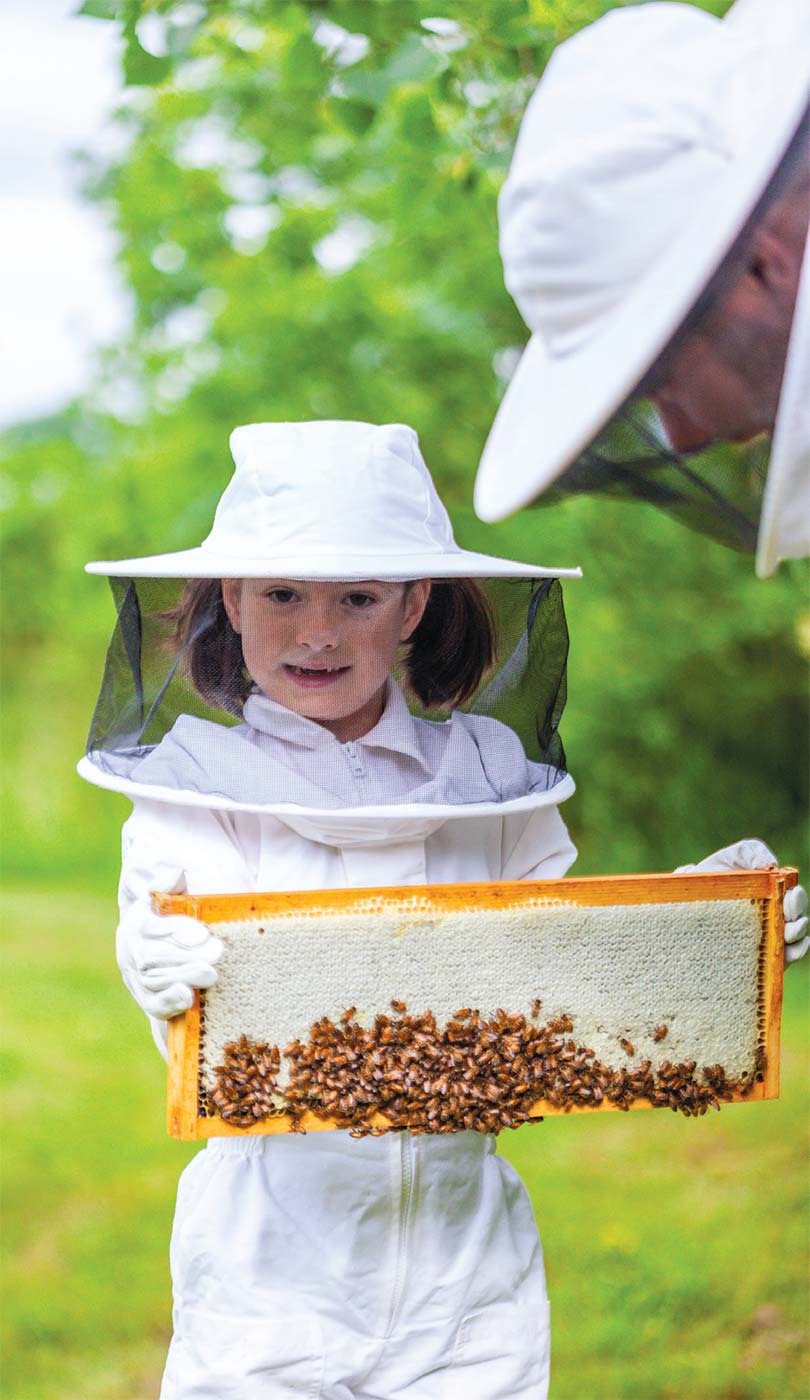
BUZZWORDS
While talking with Rick and Danielle DeMulling about beekeeping, I encountered several terms I wasn’t previously familiar with. If the beekeeping jargon is new to you, too, this list of beekeeping terms will keep you buzzing along with the best of ’em.
APIARY: The general term for where bees and hives are kept.
BROOD: Immature bees in the form of eggs, larvae or pupae.
COLONY: All of the worker bees, drones, queen and developing brood living together in one hive.
DEEP: The common term for the deeper-size hive box section.
DRONE: Male honeybee that impregnates the queen.
FIELD BEES: Worker bees that collect nectar, pollen and water for the colony.
FRAME: A piece of wood or plastic designed to hold the honeycomb.
HIVE: A container for housing a colony of honeybees.
NUCLEUS HIVE (aka “NUC”): A man-made enclosure housing a small starter colony of bees until it grows into a larger colony. Nurse Bees: Young bees that feed and care for the developing brood, the drones and the queen.
QUEEN: The only reproductive female bee in the colony, identified by her longer and plumper abdomen than other worker bees.
SCOUT BEES: Worker bees searching for new sources of pollen, nectar and water.
SUPER: A hive box placed above the brood chamber and used to store surplus honey.
SWARM: A large number of honeybees and their queen leaving the hive to start a new colony elsewhere.
WORKER BEES: Female bees with undeveloped reproductive organs that collect nectar, pollen and water, rear the brood and carry out most other colony duties. Worker bees comprise the vast majority of bees in a normal healthy colony.


